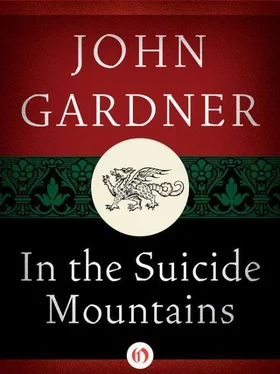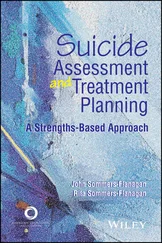“I was sickly, as a child,” he said gloomily, looking off into the woods — they were dark now, toward the middle—“and I never really did get my strength back. But that’s the least of it.” He pursed his lips, looking now at the ground a few feet ahead of him, for the confession, Chudu the Goat’s Son saw, was embarrassing for him to make. It was a mark of his despair that he made it anyway, as if nothing at all mattered one jot. “That’s the least of it,” he said again, and nodded. “The sickness apparently affected my mind. A prince is supposed to be clever. Quick-witted. Ha.” He glanced over at Chudu, then back at the ground again. “I’m doltish, that’s the truth. Sometimes I forget to tie my shoes.”
“But you’re good at heart,” Armida said encouragingly.
“Not really,” said the prince. “Take horses, for instance. I’m not so stupid I haven’t noticed how ‘real men,’ as they say, feel about horses — the way they pat them lovingly, you know, when they dismount, and always think of their horses’ needs first on long journeys. Read stories of knightly adventure, it’s all there.” He glanced at his horse as if to see if he was listening and decided, fool that he was, that horses don’t understand. “I hate horses,” he said fiercely. “My favorite way to travel is on a train.”
Chudu the Goat’s Son thought of his nights by the railroad trestle and shuddered.
“Oh, there are some things I like about horses,” Prince Christopher corrected himself — for one of his faults, as his father was always telling him (since it was a serious disadvantage in government work), was that Christopher the Sullen was abnormally fussy about truth. “I like the smell, for instance. Somebody should bottle it. But as for the rest…” He glanced at the horse’s nose. The horse’s black lips parted, trying to give Christopher the Sullen a nip. The prince jerked his hand away. Armida, unbeknownst to the prince — her face still empty of intelligence as a plate — patted the horse to calm him and distract his mind.
They walked on for a time in silence. Prince Christopher, who had his steel helmet off now, had long, raven-black, shiny hair, as soft and beautiful and well-cared-for as a woman’s. It flowed halfway down his back and had a wonderful smell; it took all Armida’s concentration to resist reaching forward and touching it, sniffing it, pressing it to her lips. His dark, handsome eyes were also womanish, and so were his gestures. When he waved his free left hand, gesticulating, he reminded her of an Indian princess. And she noticed this too: When lost in thought he had a funny way of pursing his lips as if preparing for a kiss. She blushed.
“I should never have been a prince,” he said. “It’s all some absurd mistake. All I really care about is playing the violin. I’m really good at that. And also, occasionally, I like to read books. I like books quite a lot, actually, though people say it’s sissy.” He added in haste, “Not science books or history books.” He glanced at them. A blush rose up his neck but he wouldn’t stop confessing. “I like poems and stories. I do. I wish the whole world was run by poems and stories. ‘Why not?’ I say. People laugh. Poems are for girls, they say. I say ‘Pish!’”
“Personally, I hate poetry,” Armida said, and then looked nonplussed, for she’d been trying not to let any thoughts slip out.
“I don’t believe it,” the prince said simply and impolitely. He looked up at her, eyes brightening. “You want to hear a poem?”
Armida pursed her lips, glanced at Chudu the Goat’s Son, and said nothing. The Coat’s Son chuckled grimly. He did like poetry, but only poetry about caves.
Prince Christopher’s face became more animated, and his walk, in some curious way, took on conviction, though he wasn’t walking faster. “It’s about a juggler,” he said. “A juggler who’s a magician. It’s a poem I wrote myself.”
Prince Christopher the Sullen was striding now, striking his legs out like an Irish dancer, his right hand still holding the bridle of the horse, his left hand pressed against his chest so that he could feel the fremitus as he spoke. The sun was slanting into the woods almost sideways — it would soon be dark — but the prince, declaiming his poem, was like cock-robin early in the morning. “The Juggler and the Baron’s Daughter,” he began, “by Prince Christopher the Sullen.”
It went:
Draw in near!
Draw in near!
Draw in near to
The jolly old juggler!
There once did live
A rich baron’s daughter,
And she’d have no man
That for her love had sought her,
So nice she was.
And she’d have no man
That’s made of bone and meat
But if he had a mouth of gold
To kiss her on the seat,
So grand she was.
And so the jolly juggler learnt,
Lying on the heath,
And at this pretty lady’s words,
Forsooth he grit his teeth,
So cross he was.
He juggled him a mighty steed
Out of a horse’s bone,
A saddle and a bridle too,
And sat himself thereon,
So sly he was.
He pricked and pranced that mighty steed
Before the lady’s gate:
She swore he was an angel
Come there for her sake.
(A dunce she was.)
He pricked and pranced that mighty steed
Before the lady’s bower:
She swore he was an angel
Come from Heaven’s Tower.
A prancer he was.
Then four and twenty knights
Led him through the hall;
Mean-while, as many squires
Led his horse to stall
And bade him eat.
The squires did give him oats,
The squires did give him hay,
But he was a mean one
And turned his head away.
He wouldn’t eat.
Then day began to pass
And night begun to come;
Up to her bed was brought
This gentle wo-mun.
The juggler too.
Then night began to pass
And day begun to spring,
And all the birds around the bower
Begun at once to sing.
(The cuckoo too!)
“Where are you, my perty maids,
That you come not me to?
The jolly windows of my bower
I pray that you undo,
That I may see.
“For I have here inside my arms
A duke or elst an earl.”
But when she looked upon the man,
He was a blear-eyed churl!
“Alas!” cried she.
She bore the juggler up a hill
And meant to hang him high:
He juggled him into a meal poke,
And dust fell in her eye.
Beguiled she was!
Christ and Our Lady
And sweet Saint John
Send to every haughty maid
Such another one!
Amen.
When he’d finished, the prince looked up at Armida and boyishly grinned. “What do you think?”
“Strange rhymes,” she said, and smiled shyly. She glanced down at the horse, which was blinking merry tears out of his eyes and chuckling.
Prince Christopher looked at the horse in surprise and found he was beginning to feel friendly toward him. “You like that?” he said. The horse nodded and chuckled harder. Prince Christopher mused. As had often happened, in his experience, poetry had mysteriously reclaimed the day. “You want to hear another one?” he asked.
Armida leaned forward in the saddle and batted her eyelashes. “Maybe later,” she said.
Though he’d intended to at the start — if only from curiosity about what kind of poetry a prince might write — Chudu the Goat’s Son had not paid particular attention to the poem, or anyway the last few stanzas of it, for he was thinking, with gradually increasing excitement, that perhaps Prince Christopher the Sullen might be the answer to his prayers. When poetry put the prince in a better disposition than was, apparently, normal for him, his antics had a tendency to distract Armida; and like a bolt out of the blue it had occurred to the Goat’s Son that such a tendency, pushed to an extreme, might in the end lead Armida to forsake her intention of committing suicide. With an eye to finding out how long the prince might be expected to remain with them, the Goat’s Son said now — with what seemed to Armida, the prince, and the horse an uncivil abruptness—“So your father, you say, ordered you here on a quest.”
Читать дальше












